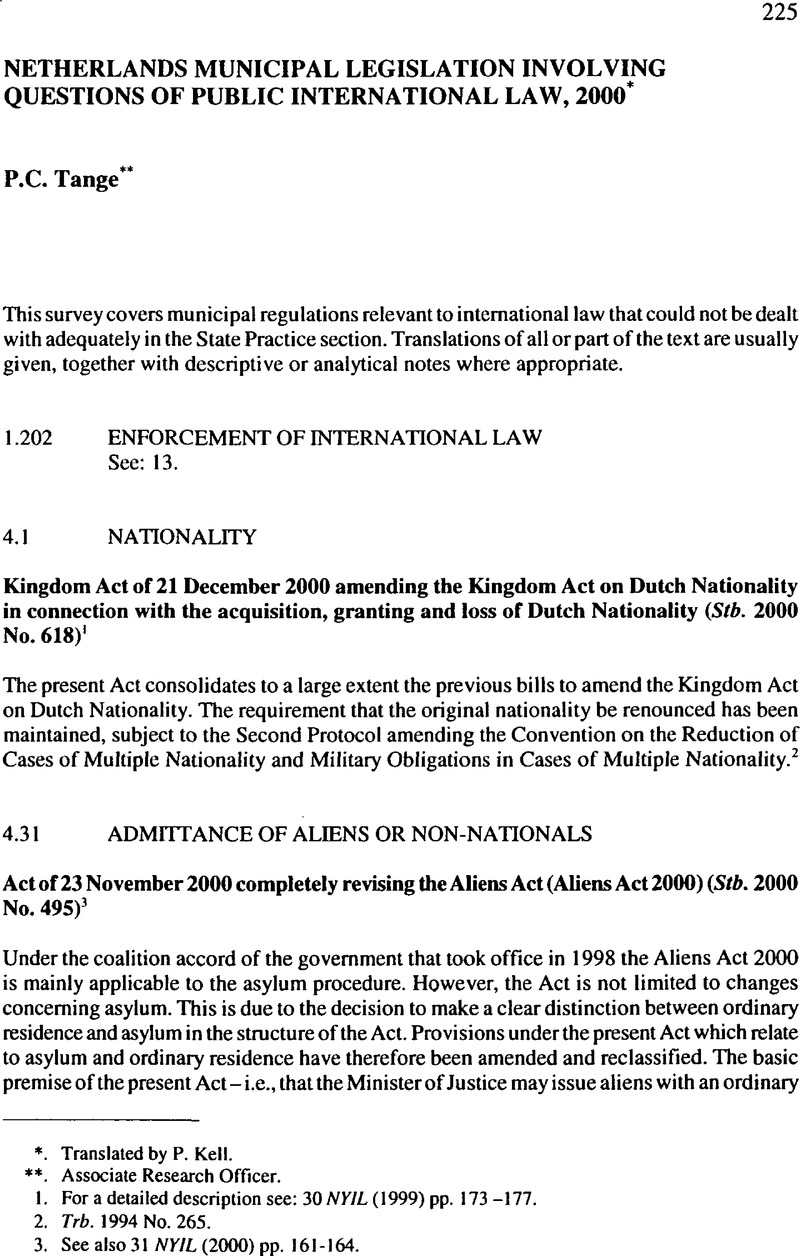No CrossRef data available.
Published online by Cambridge University Press: 07 July 2009

1. For a detailed description see: 30 NYIL (1999) pp. 173–177.
2. Trb. 1994 No. 265.
3. See also 31 NYIL (2000) pp. 161–164.
4. Trb. 1954 No. 88.
5. Trb. 1967 No. 76.
6. This is based on a different system from that of Article 6, paragraph 1, of the present Act, in which it was provided in what cases there was a right of entry by law.
7. The so-called ‘coupling principle’ was introduced by Act of 26 March 1998: aliens who are not lawfully in the Netherlands cannot claim entitlement to facilities, benefits, benefits in kind, exemptions and licences from an administrative authority. See 30 NYIL (1999) pp. 270–271.
8. Under the previous Aliens Act aliens could appeal separately against the decisions that were necessary to expel an alien, terminate the reception of an alien and evict him from his home. Under the new Aliens Act these are legal consequences that take effect by law as a result of the rejection of the application. All consequences are then submitted to the court in a single procedure.
9. Decree of 20 March 2001, determining the date of entry into effect of the Act of 23 November 2000 for a complete revision of the Aliens Act, Stb. 2001 No. 144.
10. This concerns, for example, statutes in which reference is made in the Benefit Entitlement (Residence Status) Act to the Aliens Act, and relevant statutes in the fields of social security, the labour market and housing.
11. Act of 23 November 2000 introducing the Aliens Act 2000 and related amendments to various statutes and repeal of the Municipal Care for Holders of a Provisional Residence Permit Act, Stb. 2000 No. 496.
12. Decree of 23 November 2000 implementing the Aliens Act 2000 (Aliens Decree 2000), Stb. 2000 No. 497. The Border Lodgings Regime Regulation has been amended in connection with the new Aliens Act 2000 by means of a Decree of 7 September 2000. This concerns technical amendments.
13. See 31 NYIL (2000) p. 247.
14. The Insured Persons (Health Insurance) Act Designation Decree, the Decree amending benefits in respect of which no compensatory allowance is granted (Stb. 1989 No. 573) and the Wages and Salaries Tax Implementation Decree.
15. Stb. 2000 No. 129.
16. Summarised in NILOS Newsletter No. 18 (April 2000) pp. 1–2.Google Scholar
17. Stb. 1999 No. 281, See 31 NYIL (2000) p. 248.
18. 9 January 1985, Stb. 1985 No. 129
19. Convention of the United Nations on the Law of the Sea, 10 December 1982, Montego Bay, Trb. 1983 No. 83.
20. Summarised in NILOS Newsletter No. 18 (April 2000) p. 2.Google Scholar
21. Decree of 20 September 1999, Stb. 1999 No. 412, see NYIL (2000) p. 248.
22. Act of 15 February 1980 for the taking of sanctions against certain States or territories.
23. Act of 5 July 1962 regulating the import and export of goods.
24. S/1999/726.
25. Resolution 731 of 21 January 1992; 748 of 31 March 1992 and 883 of 11 November 1993.
26. Stc. 1999 No. 92 p. 9, see also 31 NYIL (2000) p. 251.
27. Stb. 2000 No. 4.
28. Common Position of the Council of the European Union of 26 April 2000 (2000/346/GBVB) and Regulation (EC) No. 1081/2000 of the Council of the European Union of 22 May 2000 (OJ L 122)
29. Regulation (EC) No. 1334/2000 of the Council of the European Union of 22 June 2000 setting up a Community regime for the control of exports of dual-use items and technology (OJ 2000 L 159). The Regulation took effect on 28 December 2000.
30. See 29 NYIL (1998) p. 234.
31. Decree of 22 May 2000, Stb. 2000 No. 291.
32. Pursuant to Article 8 of the Sanctions Act 1977 a sanctions order ceases to have effect 10 months after it takes effect. The Yugoslavia Sanctions Order 1998 (amended by Order of 2 November 1998, see 30 NYIL (1999) p. 274) was therefore succeeded by the Yugoslavia Sanctions Decree 1999 (see 31 NYIL (2000) p. 249). However, owing to the many developments and changes, this Decree was rendered largely inoperative by successive ministerial sanctions orders (see inter alia, 31 NYIL (2000) p. 250). Only Article 1 of the original Sanctions Decree remained intact. A new Sanctions Decree was therefore introduced.
33. See the above Act of 13 April 2000.
34. Implementation of UN Resolution 1306 (2000).